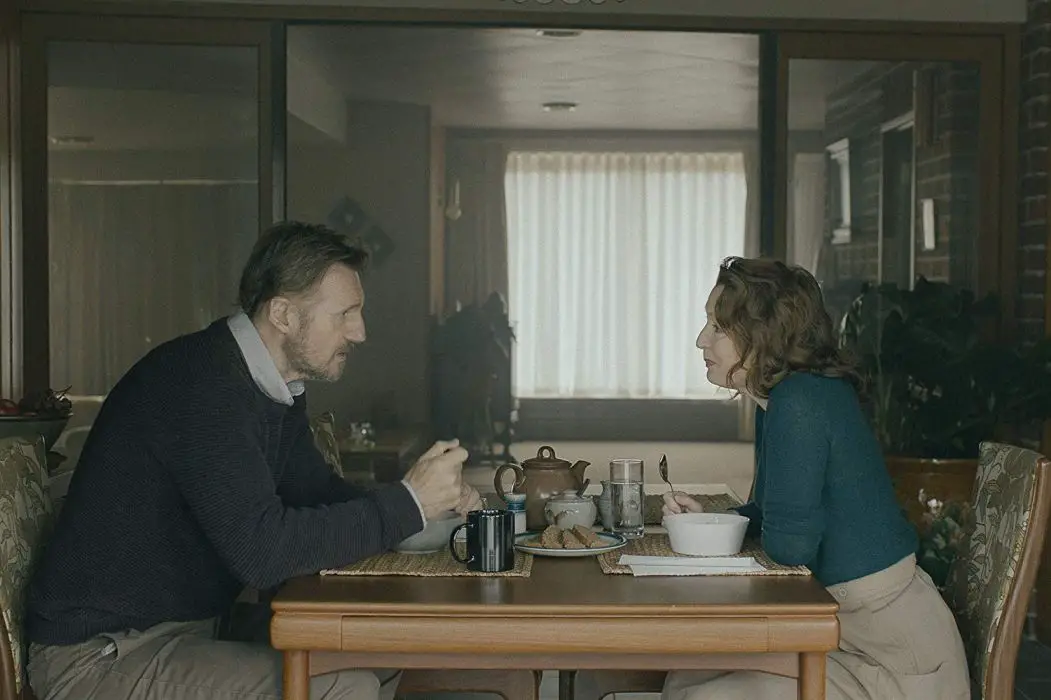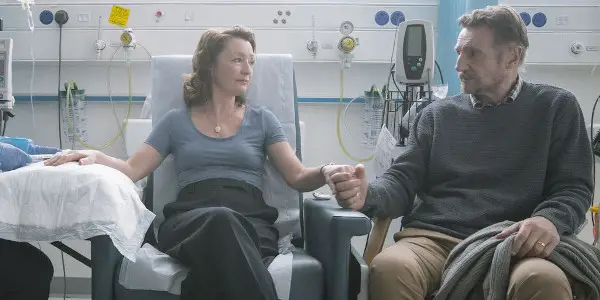ORDINARY LOVE: Losing The Reins

Luke Parker is an award-winning film critic and columnist based…
Ordinary Love isn’t just a movie about cancer, even if the intimate household drama begins with the wife (Lesley Manville) asking her longtime husband (Liam Neeson) to feel the suspicious lump under her left breast. And despite directors Lisa Barros D’Sa and Glenn Leyburn’s best – and largely successful – efforts to brew a sense of finality over the disease, it isn’t just a movie about dying. Nor is it about the totality of death. Instead, the screenwriting debut of playwright Owen McCafferty is a production bent on portraying barriers and insecurities, mixing faithfulness with worthlessness, and understanding what it means to have your home, your marriage, and your life controlled by something you can’t even see.
The script – based slightly on McCaffetry’s wife’s experiences dealing with breast cancer – also reminds spectators that the fight against cancer is a solo endeavor. Those facing a critical illness more often than not steer straight through Ross and Kessler’s infamous stages of grief. And no matter who’s around them, no matter how devoted or affectionate or patient or understanding they are, the patient does it alone. They feel the pain. They are the pain.

Cancer dramas aren’t uncommon. And in many ways, Ordinary Love coasts across the beats of the grim, medical subgenre. What elevates it, however, as both a film and a dissertation of life is its focus on how a married couple can be battered by the ordeal, and yet find a way to overcome it by blending humor, hostility and love.
Before Death Do Us Part
Tom (Neeson) and Joan have been together for a long time. McCaffetry dabbles into the middle chapters of their partnership with an earnest appreciation for honesty and authenticity. Witnessing their walks together – with Manville’s short steps managing to keep pace with Neeson’s staggering strides – and overhearing their gentle bickering, it becomes clear that this tumor is one of the first new tests they’ve had to face for a similarly long time.
Through the diagnoses, the surgeries, the appointments and so on, they react to the waves of new information in consistently different ways: Joan is prepared for the worst, while Tom does what he can to sustain a tough front, worried that his wife will learn how scared he truly is. Slowly, the cancer inflates and creates a strange distance between them (something D’Sa and Leyburn illustrate physically – be it between panels of glass or the booming presence of medical machines). While Joan lies in her bed upstairs, vomiting after her chemo and unable to break out of her fever for at least some semblance of sleep, Tom sips his beer downstairs.

In these moments, the audience is forced to question whether or not two people are designed to withstand this opponent together. And as the film progresses through chemotherapy and hospital visits, where the doctors are sympathetic but emotionally absent, we then begin to question how anybody could ever expect to stand up to cancer alone. The film’s sole focus on Joan and Tom makes for a constricting, suffocating experience, though the fact that Neeson and Manville are both extraordinary actors who can convince viewers of the long history between the characters brings the film to life.
Ordinary Love is the kind of movie that knows trips to the supermarket and marathons of bad TV are at the core of a long marriage. It may not be the easiest or the most entertaining thing to watch – even to those who feel a personal connection with the characters – but it never feels false.
Strength in Numbers
Maybe it’s because of Lesley Manville’s presence that Ordinary Love feels like the antithesis to Phantom Thread. In the Paul Thomas Anderson film, Manville plays witness to a marriage that was sustained entirely by pain, as Reynolds Woodc*ck and Alma would trade blows and feed their marriage through building each other back up. Here, the incomparable mental and physical pain between both Tom and Joan challenges their marriage at nearly every point.
But in their confrontations with fear and each other, Joan and Tom are able to find indirect consultation through the friendship of Peter (David Wilmot), a former teacher of their daughter. The married couple spot him across the lobby one morning while waiting for their next chemo appointment and it is Joan, eventually, who reignites the connection.

Like the rest of the film, which is almost painfully reserved in terms of expositional detail, these segments with Peter contribute to a suffocating, narrow-minded dialogue about cancer. Though it is unfair to say that Tom and Joan don’t find solace through him – whose disease is terminal – and his lover – who always retreats to the hospital’s cafeteria – Peter and Joan’s stories can be described as fleshed-out worst-case scenarios.
Conclusion: Ordinary Love
Ordinary Love’s minimalist approach to the narrative puts a lot of pressure on the performers, but fortunately, Manville, Neeson and Wilmot shine through at nearly every instance. If they hadn’t, the film would nearly implode. But because they have, it isn’t larger than life. And that’s an accomplishment.
Have you had the chance to see Ordinary Love yet? Be sure to drop us a comment when you do and share your thoughts on the film!
Ordinary Love is playing in select theaters now.
Does content like this matter to you?
Become a Member and support film journalism. Unlock access to all of Film Inquiry`s great articles. Join a community of like-minded readers who are passionate about cinema - get access to our private members Network, give back to independent filmmakers, and more.
Luke Parker is an award-winning film critic and columnist based in the Baltimore-Washington metropolitan area. As an entertainment journalist, he has interviewed several members of the film industry and participated in some of its most prestigious events as a member of the press. Currently, he is working to obtain his bachelor’s degree in Mass Communication at Towson University.













